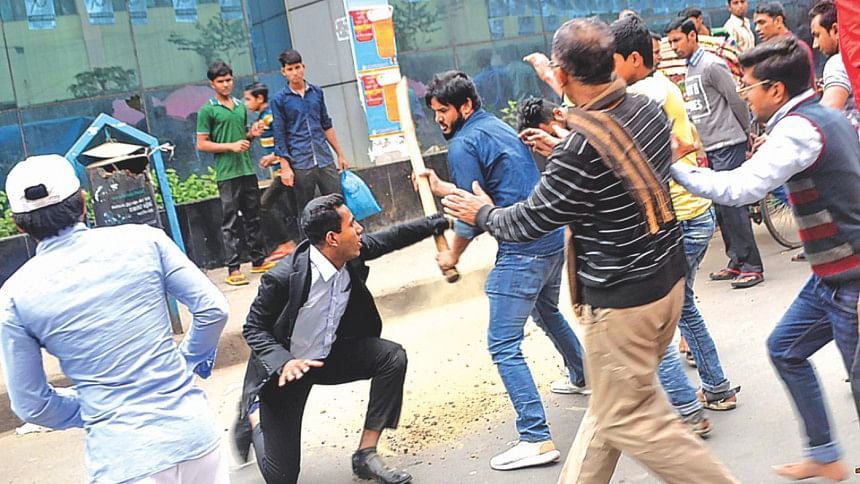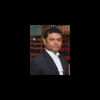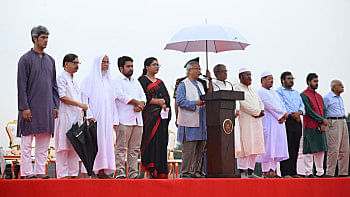Election violence and our expectation

The 11th parliamentary election has sparked some age-old questions which remain unanswered till today. It is said that vote is for change but what change are we talking about? As we know too well, a change of parties does not guarantee a change in the quality of living and fulfilment of needs and basic human rights of the common people.
The next question that arises is, how can we bring about substantive change? For the last two decades, the right to freedom of expression has always been grudgingly provided to the people—and often not at all. People have been persecuted in the name of maintaining peace, law and order, hurting sentiments, tarnishing the image of the state and most frequently, for defamation.
Freedom of expression bears significant importance for us—our independence from the British and subsequently from Pakistan proves our thirst for the right to freedom of expression. But has the scenario really changed for the common people after all these years? What qualitative change we have achieved so far?
Are we in fact in a position to choose our representatives in Parliament? The Constitution (Article 7A), other than saying that the citizen of the country shall exercise their power through their representatives, has not given any other power to the people to make their choice or question the office of their elected representative, if he fails to perform his/her duty. On the contrary, Article 70 of the Constitution makes the elected representative accountable to the political party he belongs to, instead of to the people. We have been dreaming of democracy with all these latent defects and contradictions in our Constitution. These contradictions have been so obvious that we could never taste the flavour of democracy our fore-fathers fought for.
So, is the forthcoming national election going to make any difference at all? With all these questions, fear and confusion, people are preparing for the next national election.
Has the election preparation been peaceful?
Violence has become an integral part of our elections, be it for local or national elections. People are becoming casualties for no reason. The perpetrators do not face any consequences when crimes are committed in the name of “election violence”.
We seem to use this term as a euphemism to give legitimacy to the criminal offences that otherwise would be considered a criminal offence if perpetrated by any ordinary man. A criminal offence is always a criminal offence and it cannot be legitimised under any circumstances. But not a single court case filed for violence during elections has seen any conclusion in the past two decades.
It is often said that the party that came in power failed to ensure justice. But since when has the judiciary become part of the government? Even before the formal independence of the judiciary through the case fought by district judge Masdar Hossain (Secretary, Ministry of Finance v Masdar Hossain (1999), 52 DLR (AD) 82), the function of the judiciary has never been under direct control of the administration. The judiciary in our country has been established under the provisions of the Constitution and thus the judiciary also has accountability towards the people of the country. But the judiciary had been failing to ensure justice when it comes to dealing with criminal offences relating to the elections.
Having said that, law enforcing agencies play a vital role in the criminal justice system. If they fail, then the whole system fails. Law enforcing agencies are a part of the administration and the judiciary does not have their own investigation agency till today. Therefore, the judiciary does not have any effective, let alone direct, control over them. This could be attributed as the main reason for total failure to charge the perpetrators of election-time violence in the past. But the question is whether playing the blame-game is the only solution or whether there have been serious efforts to look for a solution to end this status quo?
We used to see people attacking each other in the pursuit of snatching poll boxes and ballot papers in polling centers on election day and afterwards. But this time, the violence began way before election day which is a new phenomenon of election-time violence. There have been reports of numerous physical attacks on the candidates and their supporters, but little is known about the legal action being taken by law enforcing agencies to contain the violence and bring the perpetrators to justice.
Following the declaration of the election schedule, it is the responsibility of the Election Commission to contain polls-time violence, and the EC has completely failed to discharge their duty. Having said that, the EC at least on two occasions acted responsibly after getting complains from the affected candidates and transferred the 'Officer in Charge' of the concerned police stations.
What that also goes to prove is that law enforcing agencies, in many places, had actually been acting in a partisan manner! The political polarisation of the administration has already plagued the whole system—and this is the desired outcome one would expect from the polarisation. However, for how long would the people of the country allow this to continue? The election will probably not answer all the questions but raising them loud and clear will definitely help us seek effective solutions.
Violence against members of the minority communities has also become a common phenomenon after elections. Since 2001, not a single perpetrator has been prosecuted for the large-scale offences committed against the Hindu communities. Violence after the 2014 national elections enjoyed the same impunity, and led to populations moving out of the country. In fact, the media is still reporting incidents of affected Hindu communities deserting their homesteads. Over 10 million minority voters will vote this time yet we have seen two villages attacked in the name of election-time violence. No action has been taken so far which would ensure that the minorities will not face the aftermath of the elections.
The above discussion gives us a clear picture of the three organs of the state that have not been functioning independently. Are we just going to stay put and sit tight or will we look for a solution to end this? Is there any easy solution to it? Would seeking for a solution involve blood shed again? If we just sit and do nothing, then our independence becomes meaningless. Even with its limitation, Articles 7A of our Constitution empowers us to claim our authority over all odds and the only interpretation of the provision should be self-regulation of the people of the country though their representatives. Therefore, we must claim accountability from the three organs of the state and arm ourselves with statutory mechanisms to ensure accountability.
People's participation in the state machinery can only be ensured by getting involved with politics for change and until we are politically educated enough, change will be a far cry. So, let us vote on the 30th, keeping all our confusion and anxieties aside.
Jyotirmoy Barua is Advocate, Supreme Court of Bangladesh.

 For all latest news, follow The Daily Star's Google News channel.
For all latest news, follow The Daily Star's Google News channel. 



Comments